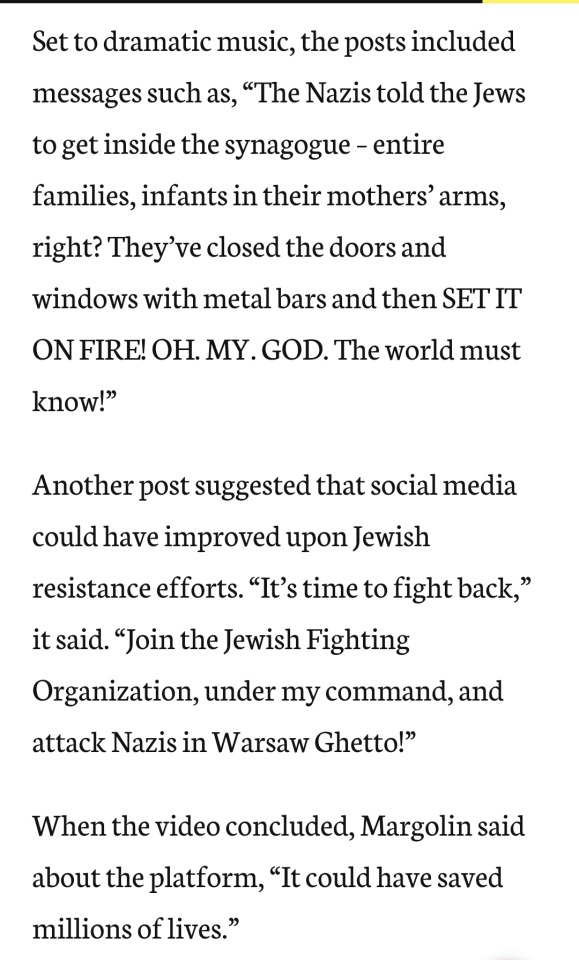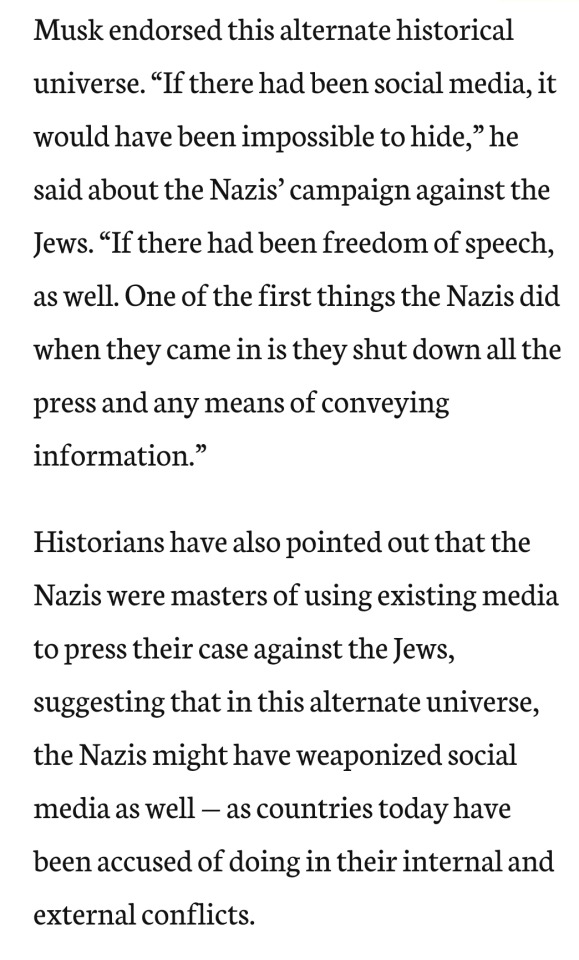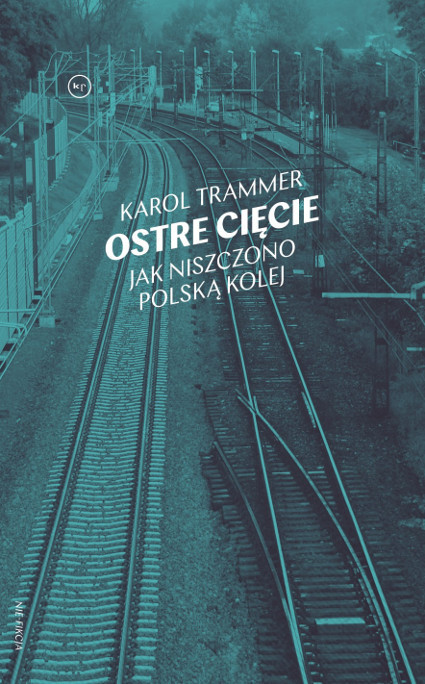#krytyka polityczna
Text
Magda Szcześniak „Poruszeni”
Krytyka Polityczna, 2023
Awans społeczny to jedno z najważniejszych zjawisk związanych z okresem PRL. Magda Szcześniak w swojej książce przygląda się tym przypadkom przez pryzmat licznych relacji im poświęconym.
Autorka dokonała ciekawego wyboru źródeł. Już sama ich struktura, zróżnicowanie w zależności od historycznego okresu, pokazuje jak zmieniało się postrzeganie społecznej rewolucji…

View On WordPress
0 notes
Text

Dobre wspomnienie z Cieszyna – Map
This print contains 35 good memories from Cieszyn city. Each one is from the different person and the memory itself is connected to the specific place on a city map.
This is a project for Świetlica Krytyki Politycznej w Cieszynie.

1 note
·
View note
Text
This is the most lukewarm take one can have but I absolutely despise Elon Musk. The man grinds my gears with every fucking thing he does and says, but the shit he pulled now is just so fucking atrocious.
This article does a pretty good job at summarizing it.




The fucking gall it takes to look at your social media platform, a breeeding ground for the alt-right and fascists, and say that it would stop the Holocaust. Holy shit.
And Margolin gifted him with a piece of Hamas rocket that hit Kibbutz Beeri. What a fucking joke. This shit is so performative. In the middle of a genocide that Israel is commiting, they parade the torment of their own people around. If they could get away with it they would probably carry the bodies of people killed on Oct. 7 around to aid their rhetoric. Not to add that if Palestinians wanted to do the same they could send rocket pieces to every single politician that remains complicit in this situation.
The rest of the article is here:
And like, all this happened after Musk visited Auschwitz. His platform is the main place to propagate antisemitism online, and he uses arguably the place where Jews suffered the most to pretend that that's not true. And of course when the topic of concentration camps comes up the narrative focuses on Jews, wich is obviously absolutely understandable - this was a genocide aimed at erasing them, and it destroyed so much Jewish culture. But like, 3 million Jews that died were from Poland. If you add the non-Jewish Poles to that number you get 6 million people dead over the course of the war, most of them killed by the very same Nazi death machine that perpetrated the Holocaust.
Holocaust is also a Polish national tragedy. It erased almost 20% of our population. We learn about it basically before we're conscious enough to understand it. The shadow of that hangs above the country, so much destruction, so many lives and so much culture erased.
A beautiful synagogue that stood in my hometown got demolished by the Nazis, along with the whole Jewish district of the town. Pretty much all Jews from my town were taken to camps or murdered on the streets. The atrocities were so common that there are memorials pretty much everywhere. And it all happened within living memory of course.
My grandmother and her sister almost got executed by the Nazis. They both managed to avoid that thankfully and are old, alive and well (my grandma's sister just celebrated her 99th birthday in good health). Pretty much everyone in Poland has had someone in their family killed by the Nazis or who fought the Nazis 2-4 generations ago. My great grandfathers all fought against them, one lost a leg during the war. The history of the Holocaust and Nazi terror is just so completely interwoven with the general history of Poland that the two are inseparable.
And it pisses me off so much that this weasel, this mistake of a man takes it and feigns an apology, making a farce out of our biggest national tragedy.
Even worse, Polish media is very polarized about the whole situation. Half of the articles ignore the atrocious things he said to suck that billionaire's dick and lick his boots. No mention of this asshole disrespecting our history, just saying how cool it is that the guy who won capitalism appeared in Poland. Fuck them.
Thankfully some newspapers retained a semblance of integrity and called him out. My two favorite ones are these:

Krytyka Polityczna made a headline that says:
Elon Musk in Auschwitz. Photobooth for the pro-Russian antisemite.

And I love the summarizing paragraph here.
"By claiming that if social media existed back then a genocide like the one in Auschwitz wouldn't have happened Elon Musk admits that he understands the Holocaust about as well as his own social media platform - X."
Great takes guys. No notes.
3 notes
·
View notes
Text
Google translation:
German historian on Polish drone collection for Ukraine
Felix Ackermann expressed his admiration for Poles and Lithuanians for social fundraising for drones for Ukraine in the "Berliner Zeitung". He called on his compatriots to follow their example.
Felix Ackermann draws attention to the fact that in Germany, after a period of great mobilization of the society, the war in Ukraine has become “commonplace”, the Germans are going on summer holidays, the society has got used to the photos of people killed in Ukrainian streets, and the drama of millions of refugees is being pushed out of consciousness.
"All this is part of the illusory normality of war, which has crept into our everyday life since 2014, although much earlier, by paying gas bills, we supported a criminal organization that took over the Russian state in 1999" - writes a German historian in "Berliner Zeitung" .
The Germans are discussing the weather, the Poles are gathering for a drone
"While the Germans, sweating, were discussing the weather, the inhabitants of neighboring Poland, also sweating, collected money for a Bayraktar drone," emphasizes Ackermann, recalling that the initiator of the collection was the leftist columnist of "Krytyka Polityczna" Sławomir Sierakowski.
The author emphasizes that Poles collected over four million euros in four weeks, "because they know the effects of the occupation of Ukrainian cities by Russian soldiers." As he adds, some of the money comes from Belarusian refugees who have been staying in Poland since 2020.
"The collection of money initiated by Sierakowski was carried out under the historical slogan 'For Your and Our Freedom'," we read in the "Berliner Zeitung".
Felix Ackermann calls the fundraising "symbolic, but also the most real act of support" for Ukraine. He reminds that 200 thousand people participated in the action. people. He draws attention to a person living on a social pension of PLN 700, who donated PLN 5 for the drone.
As the author points out, Lithuania, with a population of less than 3 million, raised five million euros for this purpose within three days.
Anyone who does not want to collect money for weapons should collect money for hospitals
Felix Ackermann criticizes the Germans for the delay in delivering tanks to Poland, the Czech Republic and Greece. Can we expect the Germans, whose motto is "No more war", to support the struggle of the endangered country on the fringes of the European Union? He stressed that in Germany there is no ban on private fundraising for the Ukrainian army.
“We are not victims of the war against Ukraine, but we systematically supported the war. Our president, for years in the chancellor's office and in the Ministry of Foreign Affairs, personally pushed the mantra about dialogue with Russia and close cooperation, ”writes the author.
"Anyone who, in principle, does not want to finance weapons, can give money for night vision or bulletproof vests to a country that has been attacked also because Putin is counting on the fact that in the fall, in the face of rising prices and social conflicts, unity in the EU will be shaken. The Germans, who remained pacifists and are now on vacation, can raise money for hospitals in Ukraine, ”reads the Berliner Zeitung.
"Ambulances, fire-fighting vehicles, specialized medical equipment, blood supplies and medicines are still urgently needed," appeals the German historian.
3 notes
·
View notes
Text
In the light of recent posts criticising canceling Russian culture, I wanted to share a rough translation of a majority of a Polish article by Jakub Majmurek: "Should we cancel Dostoyevsky because of the war?"
First of all, it should be noted that even though Russia nowadays has exposed itself as a bandit state, destroying its soft power and any claims to having international respect, for the last 20 years, Russian culture has been an important part of Putin's strategy of creating global image of the state. Putin's Russia wished to present itself not only as a powerful imperial state, but also as a state strong with its culture, or - to be more precise - its cultural heritage: great works, the value of which has long been confirmed in the canon.
True to this vision, Kremlin's Russia is faithful to the canon of great culture - understood in the 19th-century way - which is supposed to positively distinguish it from the shallow, consumerist West, destroyed by counterculture.
To illustrate how Putin's Russia sees its role as the guardian of great European culture and the exporter of its own cultural heritage, its best to remember how it was witnessed during a concert in the ancient Roman theater in Palmyra in May 2016. Palmyra, a Syrian city with an archaeological complex listed as a UNESCO World Heritage Site, has been the subject of battles between the Russian-backed forces of Assad and ISIS. In the aforementioned theater, the Islamic State carried out executions of its prisoners of war.
After the city was seized, the Russians brought classical musicians from Moscow to Palmyra and the conductor Valery Gergiyev - associated with Putin's court. Works by Bach, Prokofiev and Shchedrin were performed under his baton. Artists who have been dead for a long time, safely embedded in the canon, rather friendly to the reluctant ear of the avant-garde. Before the concert from his residence in Sochi, Vladimir Putin himself joined in with Palmyra, expressing his hope that thanks to Russia's help it will again become a "cultural resource" of Syria and the world. At the same time, a coalition of Russia and Assad was waging a brutal offensive against Aleppo.
It is obvious that the current wave of sanctions against Russia should also target the claims of the Russian state to the role of the custodian and exporter of cultural heritage. Does this mean that we are now to cancel Prokofiev, Tchaikovsky, Malevich, Tarkowski, Tolstoy and Dostoyevsky? Not to play, exhibit, show in cinemas, read the works of Russian artists?
Of course not. Such Dostoevsky is worth reading right now, although against the author's intentions: as a warning against the depth of Russia's toxic, anti-Western resentment, in opposition to the penetrating hatred of the enlightenment and bourgeois civilization of the West, to its reactionary policy. Because it is also worth remembering, especially now, how monstrously chauvinistic, in love with the empire, and often with authoritarian power, quite a large part of the Russian classics are. A free Russia, if it ever gets a chance again, will someday face the great task of reevaluating its own cultural heritage.
Returning to here and now dilemmas: the polemical, privately conducted reading of Dostoyevsky or Tolstoy is one thing, the public celebration of Russian cultural heritage is another thing: concerts, theater performances and operas. There is not much room for the latter today. The decisions of cultural institutions canceling invitations to Russian conductors and musicians or the Polish National Opera are understandable. The great masterpieces of Russian culture will remain, they can wait for better times, they will not be hurt, because they will lie on the shelves for a while. We will come back to them once we have rethought how to reread them in the context of the last war. Because staging a great Russian play or opera today as if there was no war can easily turn into a display of artistic and moral deafness.
Today we owe solidarity above all to the Ukrainian culture, which Putin's Russia wants - just like Ukrainian statehood - to be simply destroyed. In the new "Ruthenian measure" designed by the Kremlin, Ukrainian culture can only be a local, mainly folklore variant of Russian culture. It is better to use the visibility our cultural institutions have today to support the culture of a fighting Ukraine, than to once again display the works of Russian classics that the Kremlin is so eager to showcase.
However, the question arises whether contemporary Russian artists who create non-ferrous Russian culture deserve sanctions? The one who for years stood in opposition to Putin's orders, showed the Russians a different reality, ridiculed the imperial and authoritarian claims of the authorities? In Putin's Russia, independent artists fell victim to repression - and not only protest art activists like the War Group, consciously going to open confrontation with the Russian state and law.
At first, imposing sanctions on such artists and blocking their access to Western cultural institutions and markets seems deeply unfair. A boycott of contemporary Russian culture would undoubtedly also impoverish the Western world of art, literature and film. Because without contact with living Russian culture, we are poorer, without access to its culture, it is more difficult for us to understand contemporary Russia and what is happening to it right now.
Russian culture was able to sense Putinism and understand its essence much earlier than the Western political elite. Alexei Balabanov's Brother (1997) heralded the end of the Russian 1990s with their relative liberalism, but also chaos, violence, lawlessness, and the pauperization of entire groups of the population. In the film about a young Chechnya veteran, who cannot find a place for himself in Russia and enters into an open confrontation with the mafia in St. Petersburg, you can see a longing for a strong man who will finally restore order in the country. The same emotion a moment later will help consolidate Putin's support in the early years of his rule.
No one has managed to capture the moral emptiness and abomination at the heart of Putin's system better than Andrei Zvyagintsev in Leviathan (2014). The film shows contemporary Russia as a state colonized by the elite, behaving towards its own population as an organized criminal group, linked by a (un)holy alliance with the Church, which, instead of the gospel, deals with the cult of power and the naturalization of extremely unfair social relations that it creates.
If such films - but also theatrical performances, novels, works of visual arts - will not be on Western TV, VOD platforms, in theaters, museums and film festivals, we will all lose. Both the Russian artists cut off from the world audience, and audiences all over the world.
On the other hand, Russia is pursuing now a policy which places it outside the borders of the civilized community of nations. The purpose of the sanctions is to make Russia's citizens feel this as well, in order to undermine the legitimacy and stability of Putin's regime as much as possible. The more breaches of sanctions we make in this wall - for culture, art, science and other areas that are hard to accuse of supporting Putin's imperialism - the less effective they will be.
What to do?
How do you translate this into concrete actions? Certainly, the West should do everything possible to create the conditions for Russian artists who want to create a free, independent culture, for which there is no place in Putin's Russia - in Europe and other Western countries. But again, priority should be given to Ukrainian artists who are bombed and who, in the worst case scenario - in Putin's Ukraine - will not be able to create any Ukrainian culture. There is also no point in keeping in touch with the official Russian cultural bureaucracy today, unfortunately all Russian cultural organizations should be cut off from Western partners.
The biggest problem is with specific works and movies. Should they be published today, shown in theaters, cinemas, at film and theater festivals? Here I would leave the responsibility to each institution separately. On the one hand, we should probably not completely close our way to contact with the independent, critical culture of Russia - although until the war is over, its presence in the West should be the exception rather than the rule. On the other hand, it is understandable that today the space for the reception of Russian culture - especially community culture in cinema or theater - is smaller than ever. As a fan of Russian cinema, I feel deeply sad about it - but you can only blame Putin and his gang for that.
- Jakub Majmurek, Krytyka polityczna
source of the article in Polish
#keep supporting Russian independent Artists#but remember that people are literally dying in Ukraine and their culture is being destroyed#Ukrainian war#cancel culture#Russia#Ukraine#Krytyka Polityczna#Jakub Majmurek#Russian cultural heritage#Russian culture#TLDR: boycott publicly but privately do not forget - just be critical
16 notes
·
View notes
Link
Halo artystki, halo artyści! Krytyka Polityczna czeka na Was i ma do rozdania 120 tysięcy złotych.
1 note
·
View note
Link
Interview about my latest book “Weź się w garść” (Wydawnictwo Komiksowe, 2018).
2 notes
·
View notes
Text
PODSUMOWANIE ROKU 2023 - Literatura
KSIĄŻKA ROKU 2023
Brad Mehldau „Formation. Building a Personal Canon. Part One”
Equinox Publishing
HONOROWY DYPLOM UZNANIA:
Andrzej Chwalba „Wisła. Biografia rzeki” – Wydawnictwo Literackie
Norman Davies “Galicja” – Wydawnictwo Znak
Beata Dżon-Ozimek , Michał Olszewski „Ptaki krzyczą nieustannie” – Wydawnictwo Czarne
Jon Fosse “Drugie imię. Septologia I-II” – Wydawnictwo Art…

View On WordPress
#Agata Szydłowska#Andrzej Chwalba#Andrzej Wajda#Art Rage#Beata Dżon-Ozimek#Bernard Newman#Bo Wiem#Brad Mehldau#Brandy Schillace#Bruce Goldfarb#Cezary Łazarewicz#Equinox Publishing#Grzegorz Łyś#Harald Jähner#Jakub Małecki#Janice P. Nimura#Jaroslav Rudis#Jon Fosse#Konstanty Gebert#Krytyka Polityczna#Maciej Robert#Marian Eile#Mariusz Urbanek#Michał Olszewski#Norman Davies#Olga Wiechnik#Paul Scraton#Piotr Lipiński#Piotr Wróblewski#Stanisław Janicki
0 notes
Text
Targi Książki w Warszawie 9-12.09.2021
Targi Książki w Warszawie 9-12.09.2021
Oj wielu z nas na pewno spadł przysłowiowy kamień z serca kiedy zapadła decyzja o zniesieniu większości obostrzeń związanych z covid-19. A już z całą pewnością nowym organizatorom Targów Książki 2021 czyli Fundacji Historia i Kultura. Było wiadome, że Targi jeżeli się odbędą, a przypomnę że w 2020 z wiadomych przyczyn niemal wszystkie dziedziny życia zostały zamrożone, nie zostaną ulokowane na…

View On WordPress
#Andersen#Biblioteka#czyanie jest fajne#Czytam#czytam bo lubię#czytanie jest sexi#Duński Instytut Kultury#Fundacja Historia i Kultura#Instytut Pamięci Narodowej#JBL_PL#Krytyka Polityczna#książka#książki#Muzeum Sztuki Nowoczesnej#opis#PKiN#Plac Defilad#Polska Akademia nauk#Radio#relacja#resume#Rumuński Instytut Kultury#Sennheiser#Targi książki 2021#Warszawa#Wydawncitwo Słowne
0 notes
Photo

To nie jest przyjemna lektura. To studium upadku polskiej kolei, które dokonało się – a właściwie dokonywało stopniowo – w ciągu ostatnich trzech dekad; od czasu, gdy transport kolejowy przewoził prawie miliard pasażerów rocznie, do dzisiaj, gdy za wielki sukces uznaje się skorzystanie z pociągów przez niecałą jedną trzecią tej liczby.
Karol Trammer, twórca i redaktor naczelny pisma „Z biegiem szyn”, opisuje krok po kroku, co stało się z polską koleją od 1989 r. Próbuje odpowiedzieć na pytanie, jak mogło dojść do tak wielkiej katastrofy polskiego kolejnictwa, do zniechęcenia milionów pasażerów do podróżowania koleją, do zniszczenia prawie jednej czwartej długości linii kolejowych w Polsce, których brak odczuwać będziemy jeszcze przez dziesięciolecia. Jak to się stało, że po wartych wiele milionów, a nieraz nawet miliardów modernizacjach, pociągi z trudem osiągają czasy przejazdu sprzed II wojny światowej?
Tematyka jest szczególnie ważna obecnie, w chwili, gdy zaczynamy stawiać na ekologię i ekologiczny transport. Na tym polu nic nie jest w stanie konkurować z koleją, a ona w Polsce ma nadal znaczenie marginalne. Wbrew propagandzie uprawianej przez kolejnych ministrów i dyrektorów kolejowych spółek polska kolej nadal nie spełnia roli, którą powinna. Czytając „Ostre cięcie” możemy się przekonać, że niszczenie polskiej kolei w imię likwidacji „nierentownej” infrastruktury było niezależne od opcji politycznej, a osoby, które odbierały całym miastom i miasteczkom ich „okno na świat” nadal sprawują kierownicze funkcje w sektorze kolejowym.
Książka Trammera to kawał dobrej publicystyki wyposażonej w dużą liczbę przypisów i odwołań do materiałów źródłowych. Koniecznie powinni ją przeczytać wszyscy, którzy zastanawiają się, dlaczego pociągi tak często się spóźniają czy - dlaczego jeżdżą o porach tak dziwnych, że nikt nie może na nie zdążyć. Trammer opisuje na konkretnych przykładach, jak dla oszczędności na pracownikach i infrastrukturze PKP Polskie Linie Kolejowe wytworzyły szereg wąskich gardeł, w których niewielkie opóźnienie jednego pociągu powoduje lawinę opóźnień wtórnych, tak że rozkład jazdy rozpada się jak domek z kart.
Autor bardzo czytelnie ukazuje popularny przez dwie dekady mechanizm wygaszania popytu. Niewielkie zmiany w rozkładzie, zaledwie kilkuminutowe, które powodowały, że pociągi zamiast przyjeżdżać 10 minut przed godziną rozpoczęcia pracy, przyjeżdżały minutę po jej rozpoczęciu, przez co osoby dojeżdżające do pracy przesiadały się z pociągów do samochodów, a kolejowi decydenci mogli zamykać połączenia szermując hasłem, że nikt z nich nie korzysta. Co jeszcze gorsze, Trammer wskazuje, że oszczędności na infrastrukturze czy szkoleniach mogły być też jednym z podstawowych czynników, które doprowadziły do poważnych katastrof na kolei, łącznie z tą największą w ostatnich latach, w Szczekocinach.
„Ostre cięcie” to znakomita lektura, od której trudno się oderwać, nie tylko dziennikarstwo historyczne, ale – jak choćby w wypadku wyjaśniania przyczyn kolejowych katastrof ostatnich lat – bardzo dobre dziennikarstwo śledcze. To opowieść bardzo szczegółowa, ale też bardzo smutna, bo nie zostawia zbyt wiele nadziei, że polską kolej można jeszcze uratować. Jak zaznaczono bowiem we wstępie przez lata likwidowanie połączeń i linii kolejowych stało się ponadpartyjnym priorytetem. Realizowanym zgodnie przez kolejnych dyrektorów, ministrów i prezesów PKP. [wg]
Karol Trammer
Ostre cięcie. Jak niszczono polską kolej
Wydawnictwo Krytyka Polityczna 2019
ISBN: 978-83-662-3233-4
288 stron, 138x208 mm
oprawa miękka
0 notes
Text
Google translation:
The Russian woman heard these words in a Georgian cafe. She was furious.
A Georgian journalist presented the story he witnessed in July this year. In this way, he referred to the current behavior of Russians who are trying to get to Georgia on a massive scale. Following Putin's announcement of universal military mobilization, Russian citizens are fleeing the country en masse. Their behavior is in many cases out of place.
Davit Gabunia, in the face of the recent events related to the military mobilization in Russia, decided to quote the situation he witnessed a few months ago. The Georgian is terrified and disgusted with the behavior of Russian citizens who leave their homeland to escape the service. Russians come, among others just to Georgia, where they behave at home, completely disrespecting the native population. Gabunia also draws attention to the attitude of the Russians to the war in Ukraine - a sad picture emerges from Davit's memories and observations.
A quiet day in Tbilisi. A Russian entered the cafe
The journalist recalls the situation that happened in July this year, that is, before the military mobilization in Russia. A fair-haired woman with two children entered the cafe where he was hanging out. She placed the order at the checkout and asked for the password for wi-fi. Gabunia immediately noticed what the newly arrived client was dressed in, in short, it was clear that she liked the high-end brands. The waitress took the order and said that in order to log into the network, the woman had to enter "StandwithUkraine" in place of the password. She probably didn't think the client would react in this way.
"In a second, the respectable mother turned into a monster: she screamed and cursed in Russian, which I unfortunately know quite well. The waitress, not knowing Russian, clearly did not understand the problem, what the woman was saying and what made her react so furiously. hysteria, shouting that everyone understands her perfectly, but they do not want to talk to her in Russian because they are Russophobes, "we read Georgian's report, translated by a journalist from Krytyka Polityczna.
The Russian woman's fit of fury lasted ten minutes. After this time, she left the place, still cursing under her breath.
"Russians expect a greeting with a smile"
Davit Gabunia admits that Russians who flee their country behave at home after arriving in Georgia. They expect Georgians to greet them "with a smile, even with a messy and funny accent, but in Russian". The number of Russians in Georgia has been coming since March this year. Initially a bit unsure, today they have no problem with expressing their views.
"Today, they most often express their dissatisfaction, with more and more insolence, when they mention Ukraine - a country that in these circumstances cannot be forgotten by any rational and decent person" - adds Gabunia.
The man emphasizes that the war in Ukraine brings back memories of 2008 that took place in Georgia itself. "She brought back the trauma that was still alive."
1 note
·
View note
Text
tfw you read such a good book and you want to scream on Tumblr about it but it's in polish so noone will know it (The novel in question is called Fanfik and the blurb suggests a young adult novel about a highschool girl in love with a boy but it quickly turns into a gr8 polish LGBT novel - I know, unbelievable. Can't wait for the sequel)
40 notes
·
View notes
Text
20 ciastek
Na przełomie XIX i XXw. w Europie prężnie rozwijały się partie socjalistyczne, współpracujące ze sobą ponad granicami, głoszące konieczność ponadnarodowej solidarności klasy robotniczej. Jednak już 10 lat później sytuacja uległa dramatycznej zmianie. W obliczu wzrostu nastrojów nacjonalistycznych w społeczeństwach, socjaliści w Europie jak jeden mąż zagłosowali za kredytami wojennymi. Seans nienawiści zmył internacjonalizm z powierzchni ziemi, co wkrótce doprowadziło do wybuchu krwawej I Wojny Światowej. Wśród chlubnych wyjątków była niezłomna polsko-niemiecka działaczka Róża Luksemburg, która zdawała sobie sprawę do czego doprowadzi narodowe szaleństwo. Przypłaciła to życiem, zamordowana przez nacjonalistyczne bojówki, nasłane przez lewicowy rząd. Socjaliści rywalizując z prawicą o poparcie społeczne, przyjęli prawicowe metody i sprzedali swoje ideały.
Nie inaczej jest dzisiaj. Lewica w wielu krajach Europy doszczętnie skompromitowała się w latach 90. i 00., realizując neoliberalną politykę, która doprowadziła do władzy liberałów, a w końcu skrajną prawicę. W obliczu klęski, podobnie jak 100 lat temu wielu "lewicowców" idzie na skróty, próbując upodabniać się do prawicy. Wystarczy wymienić tu choćby celebrytę Slavoja Żiżka, który jako odpowiedź na kryzys migracji proponuje stworzenie czegoś w rodzaju skrajnie zmilitaryzowanego, autorytarnego super-państwa, które będzie siłą narzucać skrzętnie selekcjonowanym uchodźcom swoją kulturę. W Polsce głosem Żiżka przemawia jego fan z Krytyka Polityczna, Sławomir Sierakowski. W ostatnim tekście (http://bit.ly/2kQg2zK), gdzie celnie charakteryzuje przyczyny popularności PISu, kończy wezwaniem, by lewica obrała prawicowy kurs wobec uchodźców - bo przecież nacjonalizm i tak wygra, więc w domyśle lepiej już żeby rządziła migranto-sceptyczna lewica niż prawica, "Rachunek wydaje się więc brzydki, ale prosty."
Zwolennik brzydkich rachunków nie dostrzega, że kryzys lewicy nie wynika stąd, że popiera ona uchodźców, lecz właśnie z tego powodu, że robi to strachliwie i niezdecydowanie. Zamiast opisywać rzeczywistość językiem klasowym, który pokaże przeciętnemu europejskiemu pracownikowi, że jego interes jest znacznie bliższy interesowi przeciętnego migranta, niż jego "narodowego" szefa, lewica nieśmiało opowiada o tolerancji. Zamiast pokazywać, że terroryzm jest naturalnym skutkiem polityki Zachodu, spod nosa mruczy, że przecież nie wszyscy uchodźcy są terrorystami. Oczywiście, przypominanie o tym również jest potrzebne, ale w obliczu topniejącej klasy średniej i rozmontowywania państw socjalnych w ostatnich kilku dekadach, narracje o otwarciu się lub pomocy wywołują u znacznej części społeczeństwa - wychowanego w neoliberalnym duchu egoizmu i źle pojętego indywidualizmu - zwyczajną wściekłość. Neoliberałowie wpoili obywatelom równanie w dół - skoro ja nie mam, to czemu inny ma dostać? Soki z lat anty-wspólnotowej polityki spija prawica, która jest niczym innym jak wentylem bezpieczeństwa elit. Wymachiwanie kolorowymi flagami i zrzucenie ludowi okruchów ze stołu skutecznie przekierowuje słuszną wściekłość z banksterów i korporacji na bogu ducha winnych uchodźców, którzy są takimi samymi ofiarami finansowych spekulacji i przekrętów jak obywatele Zachodu. Na odtrutkę wobec bredni Żiżków i Sierakowskich, polecamy dobry felieton Kingi Dunin - http://bit.ly/2moZAmp.
Jedynym ratunkiem dla lewicy jest przyjęcie języka konfliktu klasowego, który uczyni wrogiem globalny kapitalizm, szczególnie w neoliberalnej odsłonie. Dla kapitału kolor skóry, narodowość, religia nie mają znaczenia same w sobie, ważny jest skuteczny wyzysk klasy pracującej. Ale gdy lokalni pracownicy zaczynają się buntować, trzeba natychmiast reanimować nacjonalizm, by pokazać im, że są lepsi od tych "brudasów", "Arabów", "ciapatych", którzy ośmielają się "zabierać im pracę". Warto przytoczyć tu starą anegdotę: Bankier, robotnik i imigrant siedzą przy stole z 20 ciasteczkami. Bankier zagarnia 19 i mówi do robotnika: - Lepiej uważaj, bo jeszcze imigrant zabierze ci twoje ciasteczko!
8 notes
·
View notes
Text
Piotr Wróblewski „Żarnowiec”
Krytyka Polityczna, 2023
Polska energetyka jądrowa nie miała i nadal nie ma szczęścia w swojej historii. Piotr Wróblewski w swoim reportażu przybliża nam jej początki opowiadając o powstawaniu Elektrowni Jądrowej w Żarnowcu. A w zasadzie pokazując dlaczego EJŻ w ogóle nie powstała.
Autor skupia się na rozmowach z osobami bezpośrednio zaangażowanymi w proces powstawania Elektrowni w Żarnowcu.…

View On WordPress
0 notes
Text
To że krytyka polityczna i Szczuka tak hype'ują pisarkę która otwarcie mówi o tym że "mężczyzna= penis, kobieta= wagina", że kobiety powinny zupełnie odrzucić mężczyzn, żyć razem w lesie i uprawiać seks z roślinami (jednocześnie nie wspominając ani słowem o tym że lesbijki w ogóle istnieją) i uważa porno, nawet takie robione przez kobiety dla kobiet, za zło absolutne, jest trochę niepokojące :/
1 note
·
View note
Text
Opozycjo, twoje milczenie jest hańbą! Wypierdalać!
Na ulicach protesty, jakich nie było od 1980, Partia rządząca nie wie co robić, a co robi lewicowa opozycja w Sejmie?
Nic.
Kurwa, nic, po prostu nic.
Gdzie są płomienne przemowy Biedronia w TVN w obronie praw reprodukcyjnych? Gdzie jest konferencja prasowa Zandberga, na której ogłasza zaproszenie Strajku Kobiet do Sejmu w celu rozpoczęcia wspólnych prac nad propozycją zmiany Konstytucji? Gdzie jest wniosek Zjednoczonej Lewicy o umieszczenie kwestii wypowiedzenia konkordatu na w porządku następnych obrad Sejmu?
Tak, uwalą wam to. Ale przynajmniej byłoby widać, że robicie to, po co was tam wybraliśmy.
Boicie się że PIS się obrazi i uwali waszą ukochaną „Piątkę dla zwierząt”? Już uwalił. Boicie się, że Kościół się obrazi i zabroni wiernym na was głosować? I tak się obrazi, i tak zabroni.
A może boicie się że Włodek Czarzasty się pogniewa i zadba o to, żeby was więcej nie wybrali? Że Krytyka Polityczna przestanie wam publikować felietony bo nie są odpowiednio woke? Że urażony queerowy barista będzie pokątnie walić gruchę do waszego sojowego latte z organicznego espresso, bo protest jest o kobietach a nie „ludziach którzy menstruują”?
Głosowaliśmyi na Lewicę, ale nie po to, żebyście teraz byli spleśniałą zupą pomidorową, którą kiedyś wszyscy lubili a która, zapomniana, kiśnie w lodówce czekając na wylanie do ścieku.
Zamiast coś robić wolicie siedzieć w kącie i mieć rację, tak jest przyjemnie i bezpiecznie. Albo szarpać się z bagietami, tak macie satysfakcję, a nikomu się nie narazicie i dieta poselska nie będzie zagrożona.
Pierdolcie się! Tak, wy też!
Wypierdalać! Do roboty albo won!
1 note
·
View note